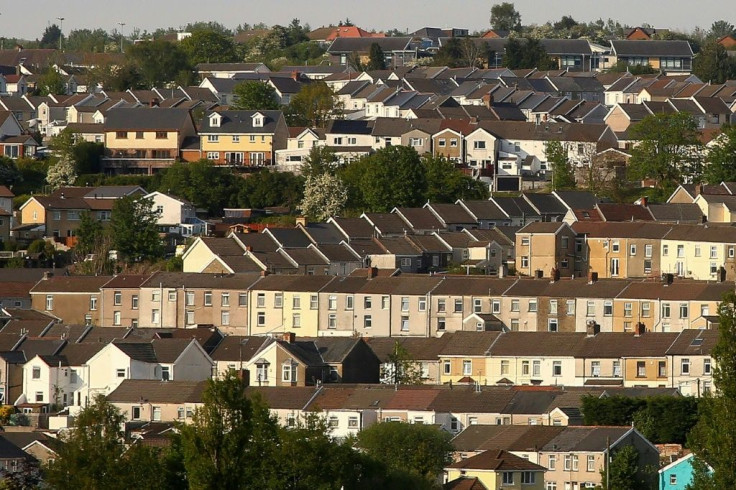British Mortgage Industry Nearly Halted By Coronavirus Effects As Lenders Withdraw New Home Loans

KEY POINTS
- Borrowers have deluged lenders with requests to allow them to defer payments
- Many banks and lenders have stopped offering new mortgages to low-deposit borrowers and first-time buyers.
- Lloyds Banking Group has capped lending at 60% LTV
The British housing and mortgage market has come to a near standstill due to coronavirus as banks withdraw loans and borrowers ask lenders to allow them to defer payments.
On Tuesday, Nationwide Building Society, one of the U.K.’s biggest mortgage lenders, pulled back from offering new mortgages to low-deposit borrowers and first-time buyers.
Nationwide also said it will withdraw all fixed-rate and tracker mortgages above 75% loan-to-value, or LTV, from sale for remortgage, first-time purchasers, and new house buys. Or, in another words, Nationwide will only offer home loans to borrowers with at least 25% equity.
The company added that it will now focus on helping existing borrowers and process mortgage applications it has already received.
"Existing applications, where a product has already been reserved, will continue to progress," Nationwide stated.
Sara Bennison, chief marketing officer at Nationwide said the company needed “to maintain the levels of service expected of us in the face of an extremely high number of enquiries about existing mortgages and ongoing applications.”
Bennison said that by continuing to offer home loans up to 75% LTV meant Nationwide could “continue supporting the housing market.”
Other British lenders have already taken similar steps. Lloyds Banking Group (LYG), which includes Halifax and Scottish Widows, has capped lending at 60% LTV. This means borrowers will need a 40% deposit or equity in their home to qualify to receive a mortgage.
“Halifax’s decision to stop lending above 60% LTV reflects the wholesale recalibration of risk that is unfolding in the mortgage market,” said Andrew Montlake, managing director of broker Coreco.
Barclays (BCS) has reduced the number of mortgage applications it will accept from brokers, while Vida Homeloans and Together Money have ceased all new mortgage lending.
Lenders have also been deluged with requests for payment holidays from cash-strapped borrowers after the government said mortgage holders hurt by the coronavirus should be given a three-month respite from paying their mortgages.
"The recent withdrawal of many higher LTV mortgage products and home purchase products is hopefully a temporary measure while lenders reassess risk in this area of the market and work out what it will be possible for them to offer while the current restrictions are in place," said Eleanor Williams, finance expert at Moneyfacts.co.uk. "With so much uncertainty at the moment, providers seem to initially be focusing on the support that their existing customers may need in the coming weeks."
But Mark Harris, chief executive of the mortgage broker SPF Private Clients, said this isn’t a funding crisis since the banks are flush with liquidity.
“There are two main issues,” he said. “The first is a processing one – [banks and lenders] are not all set up for staff to work from home. The big processing centers are closed and they are operating with a skeleton staff. There is also the issue with valuations. A lot of the big lenders will accept desktop valuations but only to a certain loan-to-value. As they can’t get a valuer out to inspect the property, it is very difficult to process a mortgage application for a higher LTV.”
Harris added: “Lenders are throwing all their resources into dealing with payment holiday requests. In the same way that people are buying food they don’t need, people are asking for payment holidays when they don’t need them. That is blocking the line for those who do.”
Chris Sykes, mortgage consultant at broker Private Finance, defends the new policies. "Lenders are having to work at a lower capacity because of staff being off and having to deal with thousands of calls for mortgage payment holidays," he said. "So they don't really have the capacity to do a lot of new mortgages right now. If they are going to do any, they want high-quality low-risk mortgages.”
Also, due to the lockdown, it is nearly impossible for prospective buyers to meet with property agents and see homes on the market.
"Lenders and borrowers face an unprecedented set of circumstances," said Robin Fieth, chief executive of the Building Societies Association. "Our hearts go out to them and our heads are clear that it would be unfair for these people to have to start their mortgage application all over again once life returns to a more normal state. A three-month extension of existing mortgage offers seems a fair and reasonable step to take."
However, borrowers who need to stop paying mortgages for a while must contact their lenders first.
“Homeowners are unknowingly putting themselves into arrears by cancelling their mortgage payments without speaking to lenders first,” says Will Kirkman on ThisisMoney.co.uk. “Amid claims that borrowers are waiting up to ten hours on the phone to speak to someone, many lenders are now asking borrowers to submit applications online to free up their helplines, or to only call if they are vulnerable or facing immediate difficulty.”
In addition, if borrowers take a lengthy mortgage holiday, their payments will likely spike in the future.
“It is likely the lender will spread outstanding payments out over the remaining term of your mortgage, so borrowers will see an increase in their monthly mortgage payments,” said Patrick Collinson in The Guardian.
© Copyright IBTimes 2025. All rights reserved.





















